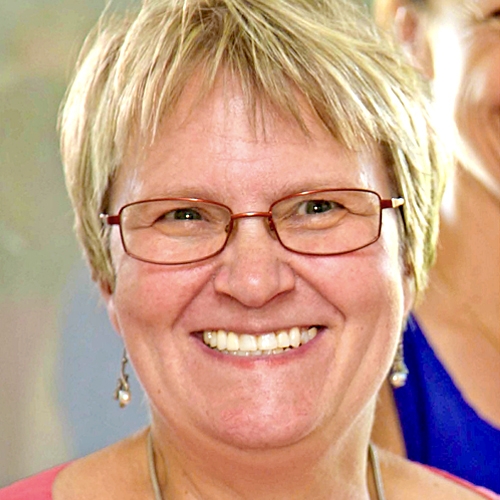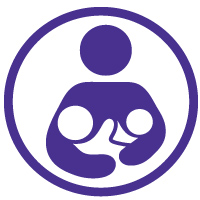 IBCLC Detailed Content Outline: Development and Nutrition / Infant Focused CERPs - Section I A
IBCLC Detailed Content Outline: Development and Nutrition / Infant Focused CERPs - Section I A
Access CERPs on Development and Nutrition / Infant for the IBCLC Detailed Content Outline recertification requirements. On-demand viewing of the latest Development and Nutrition / Infant focused IBCLC CERPs at your own pace.

Beyond the Rooting Reflex: The Role of Primitive Reflexes in Lactation

Gretchen Becker Crabb is an Occupational Therapist, Licensed Professional Counselor, and Endorsed Infant Mental Health Therapist. She is also a Certified Lactation Counselor, La Leche League Leader, and Brazleton Newborn Observation (NBO) trainer.
Gretchen’s passion is rooted in fostering lifelong relationships and connection through co-regulation in pregnancy and beyond. Her unique approach to lactation support and therapy is rooted in culturally attuned sensory, somatic, and trauma-informed mental health techniques.
Gretchen owns and operates a private practice in Madison, Wisconsin. For 21 years, she has provided developmental, trauma, feeding, and attachment support for tiny humans and their caregivers in birth to three, preschool, private practice, and peer group settings. Gretchen is an international speaker, reflective supervisor, and infant mental health consultant. In these roles, she offers compassionate, experiential, and reflective holding spaces for professionals. She is a proud United States Air Force spouse and mother of three boys.
Topic: Infant Mental Health: What Does It Look Like in Practice? - [View Abstract]
Topic: Scent-Sational Connections: The Role of Olfaction in Development - [View Abstract]
Topic: Sensory Processing and Breast/Bodyfeeding: Using Co-Regulation to Support the Feeding Relationship - [View Abstract]
Topic: Vestibular Processing: Using the Sixth Sense to Support Lactation and Parent/Infant Relationships - [View Abstract]
Primitive reflexes play an instrumental role in the birth process and lactation, motor, regulatory, and social emotional skill development. Reflexes not only serve to help us develop a sense of self, but they also assist to promote meaningful interactions with other people and the world around us. In this presentation, we explore how the integration of sensory processing and primitive reflexes support parents and infants in lactation. We will also look at how the function of these reflexes can impact learning, mental health and regulation skills in infants, children, and adults. Experiential activities will be used to enhance participants understanding of each reflex and experiment with supportive strategies to use with families.

View Details / Enroll


Dr. Rice has been working at the intersection of education and health for social justice and public good. She is the former Executive Director of the Breastfeeding Coalition of Oregon. Currently, Dr. Rice works on organizational development, communication, marketing, public policy and community engagement to advance health equity through access to donor human milk. A national thought leader, she is deeply engaged in convening conversations about the importance of maintaining women’s biological integrity, advancing feminist approaches to human milk banking and at the same time, encouraging capacity building for human milk derived therapies improving health outcomes for the most vulnerable babies.
Most recently Dr. Rice provided consulting as a Policy Associate with Mothers' Milk Bank of San Jose and has provided strategy and policy consulting for the Human Milk Banking Association of North America (HMBANA). Marion holds a doctorate in Education Leadership and is an Internationally Board Certified Lactation Consultant, IBCLC.
This session will look at how for profit corporations are seeking to aggregate, control and exploit human milk. In the absence of federal health policy and consumer regulation/protection, companies are emerging seeking to build commercial markets for human milk often under the guise of improving the economic status of women and infant health.
We will examine companies currently paying for milk both domestically and internationally and the implications for women and emerging policy both at the federal and state level.
Entities setting a price for human milk in the absence of supportive public policy may in fact undermine women’s biological integrity, infant health and contribute to the vulnerability of women and babies.
I will ask participants to consider the issues and to support models of community engagement and decision making that are women centered and women led that keep this biologically critical substance within the community from where it comes; supporting breastfeeding and benefiting women and babies.


Briana Tillman received her undergraduate degree in International Relations from the United States Military Academy at West Point. She has been a La Leche League Leader for 9 years and is a board certified lactation consultant. After spending 10 years as a stay-at-home mom, she is currently attending medical school at Rocky Vista University College of Osteopathic Medicine in Parker, Colorado. She loves spending time with her husband and three elementary-school-aged children—as a family they like to play board games, go camping, and play bluegrass and chamber music.
Topic: Breast Milk and the Microbiome - [View Abstract]
Recently, much scientific inquiry has turned to the new frontier of the “microbiome", the many microscopic beings living commensally or symbiotically in and upon the human body. Breast milk’s contribution to the development and sustenance of healthy gut bacteria is immense, in that it not only provides bacteria for the initial seeding, but also contains an ideal nutrient base designed to promote beneficial flora while simultaneously discouraging pathogens. This presentation will explore the relevant theories and understanding of these processes.
We will delve into the long-term health outcomes associated with the microbiome, including obesity, diabetes, brown-to-white fat ratio, gastrointestinal concerns, and allergies. This presentation will also explore the impact of breast milk storage and pasteurization techniques on its microbiologic activity. Additionally, we will look at other aspects of the microbiome as they relate to skin-to-skin contact, vaginal birth and breastfeeding.
Finally, we will describe bacterial roles in infant neurological development, allergies, digestion, immunity, and future obesity. Healthcare practitioners need to be aware of the benefits of microbial diversity in order to effectively counsel new parents, especially those with infants at risk for immunological or digestive concerns.


Meg is the mother of three breastfed boys and lives with her husband and children in QLD, Australia. She is an International Board Certified Lactation Consultant (IBCLC) in private practice and works with parents to help them reach their breastfeeding goals. She has a degree in psychology and her prior work was is in counselling and sexual health. She was a La Leche League Leader (breastfeeding counsellor) for seven years before becoming an IBCLC. Meg is the author of two books including, "Boobin' All Day...Boobin' All Night. A Gentle Approach To Sleep For Breastfeeding Families". She has published articles in numerous parenting magazines and websites. She was also filmed for a short documentary, "Lactaboobiephobia", based on one of her blog posts which was released in 2016.
Topic: Breastfeeding With A Tongue Tie. How Can We Help When A Tie Revision Is Not Possible? - [View Abstract]
Topic: Exclusively Breastfeeding Triplets-Case Studies - [View Abstract]
Topic: Social Media Backlash – Addressing Emotionally Charged Responses - [View Abstract]
Topic: What to Do When the Laid-Back Breastfeeding Position Doesn’t Work…Self Attachment, the Flipple Technique and the Koala Hold All With a “Hands Off” Approach - [View Abstract]
Breastfeeding a baby with Down syndrome can bring many challenges to both mother and baby and many women are told they will be unable to breastfeed. This presentation will give examples of women who have faced different challenges breastfeeding their babies with Down Syndrome, yet had successful breastfeeding outcomes with the right support and information. This will include case studies with specific tips and suggestions that will help the lactation professional in offering support to these families. These women have faced many challenges including; prematurity, low muscle tone, breastfeeding into toddlerhood and a toddler who did not start breastfeeding until his mother had another baby when he was 2 ½ years old! This presentation will cover the most common challenges that families face when breastfeeding a baby with this condition and the possible solutions for them.

View Details / Enroll

Breastfeeding and Neonatal Abstinence Syndrome

Amber Valentine is a Speech-Language Pathologist who graduated from the University of Kentucky with her MS in Communication Disorders. She is a Board Certified Specialist in Swallowing and Swallowing Disorders and an International Board Certified Lactation Consultant, as well as a Certified Neonatal Therapist (CNT). She worked for Baptist Health Systems, Inc for 8 years before moving to Florida where she worked for Wolfsons Children’s Hospital and Mayo Florida. She is now back in Kentucky working for Baptist Health Lexington. She has experience in adults and pediatrics with feeding and swallowing difficulties including: bedside swallow evaluations, Modified Barium Swallow studies, FEES, and pediatric feeding evaluations including NICU. She has experience with head and neck cancer patient including evaluation and treatment of swallowing difficulties, PMV use, and voice after total laryngectomy including TEP. She has provided guest lectures for the University of Kentucky, Eastern Kentucky University, and the University of Louisville on feeding and swallowing topics. She has presented at the hospital, local, state, national, and international levels on pediatric feeding/swallowing and breastfeeding.
Topic: Breastfeeding Medically Complex Infants in the Neonatal ICU - [View Abstract]
Topic: Building a Successful Breastfeeding Program in the NICU: Challenges and Practical Solutions - [View Abstract]
This presentation is designed to discuss the role of feeding therapy, breastfeeding, and family dynamics with infants with neonatal abstinence syndrome. These baby/family dynamics can be complex situations and feeding difficulties are extremely common. Breastfeeding education/information can be implemented prior to birth along with other education for families to promote more infant/family bonding and reduce stress of being born in substance exposure. Breastfeeding dramatically reduces stress signs in infants exposed to substances neonatally. Working together as an interdisciplinary team, we can set these families up for more successful feeding opportunities and decreased stress in developmental care.

View Details / Enroll

Breastfeeding as a Prevention Strategy for Speech Language Disorders

Lina Mazzoni is a Lactation Consultant, IBCLC with a Bachelors Degree in Speech and Language Therapy. Since 2013 she has been working primarily with children and specialized in the treatment of sucking, swallowing and feeding disorders. In 2019 she became a Lactation Consultant to be able to work equivalent with the children and the mother. As a working mom she worked part time as a Lactation Consultant in a hospital in Hamburg, started her own privat practice in 2019 and since october 2021 she works exclusively in her private practice as a lactation consultant and SLT. She also works as an Instructor in lactation education and further education regarding feeding developement and disorders . Lina has two children and lives with them and her husband in Hamburg, Germany.
Topic: Sucking Disorders in Children with Neurological, Muscular, Genetic or Anatomical Diseases - [View Abstract]
The prevention and early treatment of diseases is part of a Speech and Language Therapist's working field.
The question is, at what point can SL Therapy have a preventative influence, what are the advantages of early consultations and treatments and what significance does a nursing and lactation consultation have in this context. Asha and Fletcher (2005, S.1) called a SL Therapist and a Lactation Consultant a "Baby's feeding dream team", so the combination of these two professions might be a good way to facilitate difficult breastfeeding relationships and reduce SL disorders over the years.
Breastfeeding is the physiological way to feed a baby. It supports the Mother-Child-Bond and sets the foundation for the undisturbed organic, sensorial, motoric, cognitive, oral and social development. If there is a problem with the ingestion of food (oromotor dysfunction or dysphagia), the topic of breastfeeding tends to move to the background. But what if breastfeeding can be used as part of the therapy? Promoting early SLT and by supporting the breastfeeding and preventing the use of artificial teats, which can have a negative influence especially on the oromotor and muscle development, the outcome might improve.

View Details / Enroll

View Details / Enroll

Breastfeeding Medically Complex Infants in the Neonatal ICU

Amber Valentine is a Speech-Language Pathologist who graduated from the University of Kentucky with her MS in Communication Disorders. She is a Board Certified Specialist in Swallowing and Swallowing Disorders and an International Board Certified Lactation Consultant, as well as a Certified Neonatal Therapist (CNT). She worked for Baptist Health Systems, Inc for 8 years before moving to Florida where she worked for Wolfsons Children’s Hospital and Mayo Florida. She is now back in Kentucky working for Baptist Health Lexington. She has experience in adults and pediatrics with feeding and swallowing difficulties including: bedside swallow evaluations, Modified Barium Swallow studies, FEES, and pediatric feeding evaluations including NICU. She has experience with head and neck cancer patient including evaluation and treatment of swallowing difficulties, PMV use, and voice after total laryngectomy including TEP. She has provided guest lectures for the University of Kentucky, Eastern Kentucky University, and the University of Louisville on feeding and swallowing topics. She has presented at the hospital, local, state, national, and international levels on pediatric feeding/swallowing and breastfeeding.
Topic: Breastfeeding Medically Complex Infants in the Neonatal ICU - [View Abstract]
Topic: Building a Successful Breastfeeding Program in the NICU: Challenges and Practical Solutions - [View Abstract]
Feeding is the most complex task of infancy, even in term babies with no complications. There are many diagnoses, conditions, syndromes, and co-morbidities that can impact feeding in neonates and infants. This talk will briefly highlight many of those, but we will focus on three specific populations of interest –Cleft lip and palate, Infants of Diabetic Mothers, and Down Syndrome. We will discuss the specific implications these conditions can have on feeding, why these infants may have difficulty, and the classic symptoms one could expect to see. The differences between delayed and disordered feeding will also be addressed. Strategies and adaptions for both breast and bottle feeding will be discussed. Positioning, nipple flow rate, and external strategies will be explained. Case studies will be shared at the end of the presentation.

View Details / Enroll

View Details / Enroll

Breastfeeding of Preterm Infants – Associated Factors in Infants, Mothers, and Clinical Practice

Clinical nurse researcher in the area of breastfeeding preterm infants and skin-to-skin contact at dept. of Neonatology, Copenhagen University Hospital Rigshospitalet and leader of Knowledge Centre for Breastfeeding Infants with special needs. Member of the Nordic and Quebec Working Group expanding the BFHI for neonatal wards (Neo-BFHI).
Breastfeeding of preterm infants is associated with factors in infants, mothers and clinical practice.
Extremely preterm infants establish exclusive breastfeeding at a higher PMA and have twice the risk of not being exclusively breastfed at discharge. Low education, less breastfeeding experience, and smoking are maternal factors negatively associated with exclusive breastfeeding.
Admitting mothers to the NICU together with the infant immediately after delivery is associated with earlier establishment of exclusive breastfeeding. The later the initiation of breast milk expression, the later the establishment of exclusive breastfeeding, and the higher risk for failure of exclusive breastfeeding at discharge and inadequate breastfeeding duration. The use of a nipple shield is associated with failure of exclusive breastfeeding at discharge and inadequate duration of exclusive breastfeeding. Minimizing the use of a pacifier during breastfeeding establishment and test weighing the infant are positively associated with exclusive breastfeeding at discharge.

View Details / Enroll

Breastfeeding Twins and Triplets: Supporting Families During Their Breastfeeding Journey

Kathryn Stagg is mum to 4 boys, twins and 2 subsequent singletons. She trained as a breastfeeding peer supporter and volunteered in the groups for years in and around Harrow, NW London, UK.
Kathryn caught the breastfeeding support bug and decided to further her knowledge training as a Breastfeeding Counsellor with the Association of Breastfeeding Mothers and then qualifying as an IBCLC 5 years ago.
Kathryn started Breastfeeding Twins and Triplets Facebook group almost 8 years ago and it now has over 9000 members. It has recently been made into a UK charity. Kathryn is passionate about delivering high quality breastfeeding support to as many twin and triplet families as possible, creating resources and educating health care professionals and breastfeeding supporters. She runs a small private practice and continues to teach music part time, her original career path. Kathryn is the author of Breastfeeding Twins and Triplets; a guide for professionals and parents.
/p>
Topic: Don't Let Us Fool You: Breastfeeding in Late Preterm and Early Term Babies - [View Abstract]
This session will help you understand the challenges of a multiple pregnancy and birth. Discover preparations that can help ease stress and increase success in lactation. Learn how to support families experiencing premature birth. You will understand the best way to help parents establish breastfeeding their multiples, even with late preterm/early term birth. This session will help attendees gain and understanding of how to navigate the challenges of breastfeeding multiples and how to support families effectively during the different stages of their breastfeeding journeys.

View Details / Enroll

View Details / Enroll


Barbara D. Robertson, IBCLC, has been involved in education for over 34 years. She received a Bachelor’s degree in Elementary Education in 1988 and her Master’s in Education in 1995. Barbara left teaching elementary students in 1995 to raise her two children. Barbara is now the Director of The Breastfeeding Center of Ann Arbor and of the brand new business LactaLearning.
The Breastfeeding Center of Ann Arbor will still continue to serve breast/chestfeeding families and now LactaLearning will be dedicated to all of Barbara’s professional lactation trainings. Barbara has developed two 95 hour professional lactation training, a group training and a completely self study training with Nancy Mohrbacher. Barbara’s idea of creating professional book groups has exploded with her hosting Making More Milk with Lisa Marasco, Supporting Sucking Skills with Cathy Watson Genna, Breastfeeding Answers, 2nd Edition with Nancy Mohrbacher, and new for the fall, Safe Infant Sleep with Dr. James McKenna. Barbara will be hosting a one day online conference in the fall with Lisa Marasco and Cathy Watson Genna using all of her tech savvy skills to make this a one of a kind experience. Barbara is also a speaker for hire on a wide variety of topics including Motivational Interviewing. Barbara volunteered for the United States Lactation Consultation Association as the Director of Professional Development for 4.5 years.
She just retired as Associate Editor for Clinical Lactation, a journal she helped create for USLCA. Barbara has free podcasts, a blog, and Youtube videos which can all be found on her websites lactalearning.com and bfcaa.com. She has written many articles as well. She loves working with parents and babies, helping them with breast/chestfeeding problems in whatever way she can.
Topic: Breastfeeding: Baby’s First Milestone - [View Abstract]
Topic: Clinical Assessment and Management of Low Milk Production - [View Abstract]
Topic: Deconstructing Online Messaging: Ethical Considerations - [View Abstract]
Topic: Milk Sharing and Milk Banking: Building Knowledge for Better Outcomes - [View Abstract]
Topic: The Baby's Not Gaining Weight! Now What? - [View Abstract]
Topic: The Great Nipple Shield Debate - [View Abstract]
Breastfeeding is widely acknowledged as being the healthiest way to feed an infant for at least two years. In the United States of America, the CDC 2014 Breastfeeding Report Card states that 79.2% of mothers start out breastfeeding. However, as the babies get older, these numbers plummet. Only 49.4% of these babies are receiving any breastmilk by 6 months of age. We know from the literature that the primary reasons mothers stop breastfeeding in these early months are pain and worrying about their breastmilk supply. These are problems with solutions if the proper support is in place. Why is this support lacking? Is it because for all of the talk, “breast is best”, the importance of breastfeeding is not really valued? What if successful breastfeeding was reframed into a milestone? Baby’s first milestone? This presentation will explore other milestones, walking, talking, and learning to read, and what happens if babies and young children are not reaching these markers in a reasonable time frame. What support systems are in place to help these milestones be achieved if babies are faltering? The possible reasons for a baby not being able to breastfeeding and possible solutions will then be examined from the lens of having proper support systems in place.

View Details / Enroll
















